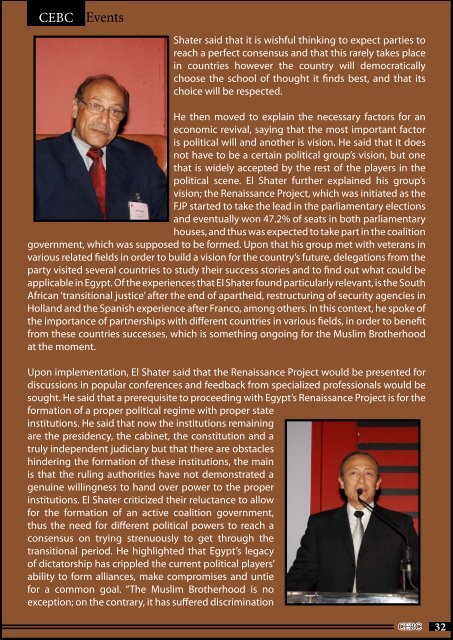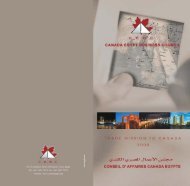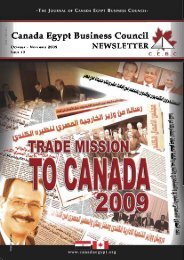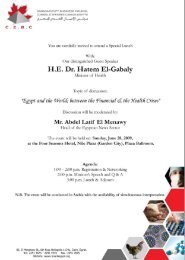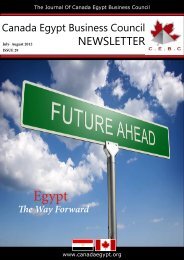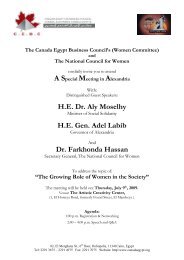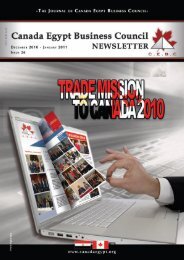NEWSLETTER - Canada Egypt Business Council
NEWSLETTER - Canada Egypt Business Council
NEWSLETTER - Canada Egypt Business Council
Create successful ePaper yourself
Turn your PDF publications into a flip-book with our unique Google optimized e-Paper software.
CEBC<br />
Events<br />
Shater said that it is wishful thinking to expect parties to<br />
reach a perfect consensus and that this rarely takes place<br />
in countries however the country will democratically<br />
choose the school of thought it finds best, and that its<br />
choice will be respected.<br />
He then moved to explain the necessary factors for an<br />
economic revival, saying that the most important factor<br />
is political will and another is vision. He said that it does<br />
not have to be a certain political group’s vision, but one<br />
that is widely accepted by the rest of the players in the<br />
political scene. El Shater further explained his group’s<br />
vision; the Renaissance Project, which was initiated as the<br />
FJP started to take the lead in the parliamentary elections<br />
and eventually won 47.2% of seats in both parliamentary<br />
houses, and thus was expected to take part in the coalition<br />
government, which was supposed to be formed. Upon that his group met with veterans in<br />
various related fields in order to build a vision for the country’s future, delegations from the<br />
party visited several countries to study their success stories and to find out what could be<br />
applicable in <strong>Egypt</strong>. Of the experiences that El Shater found particularly relevant, is the South<br />
African ‘transitional justice’ after the end of apartheid, restructuring of security agencies in<br />
Holland and the Spanish experience after Franco, among others. In this context, he spoke of<br />
the importance of partnerships with different countries in various fields, in order to benefit<br />
from these countries successes, which is something ongoing for the Muslim Brotherhood<br />
at the moment.<br />
Upon implementation, El Shater said that the Renaissance Project would be presented for<br />
discussions in popular conferences and feedback from specialized professionals would be<br />
sought. He said that a prerequisite to proceeding with <strong>Egypt</strong>’s Renaissance Project is for the<br />
formation of a proper political regime with proper state<br />
institutions. He said that now the institutions remaining<br />
are the presidency, the cabinet, the constitution and a<br />
truly independent judiciary but that there are obstacles<br />
hindering the formation of these institutions, the main<br />
is that the ruling authorities have not demonstrated a<br />
genuine willingness to hand over power to the proper<br />
institutions. El Shater criticized their reluctance to allow<br />
for the formation of an active coalition government,<br />
thus the need for different political powers to reach a<br />
consensus on trying strenuously to get through the<br />
transitional period. He highlighted that <strong>Egypt</strong>’s legacy<br />
of dictatorship has crippled the current political players’<br />
ability to form alliances, make compromises and untie<br />
for a common goal. “The Muslim Brotherhood is no<br />
exception; on the contrary, it has suffered discrimination<br />
CEBC 32


